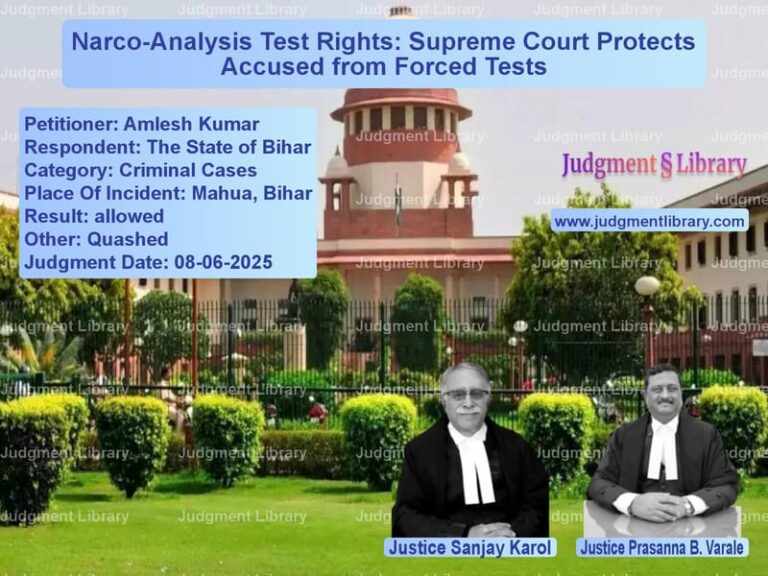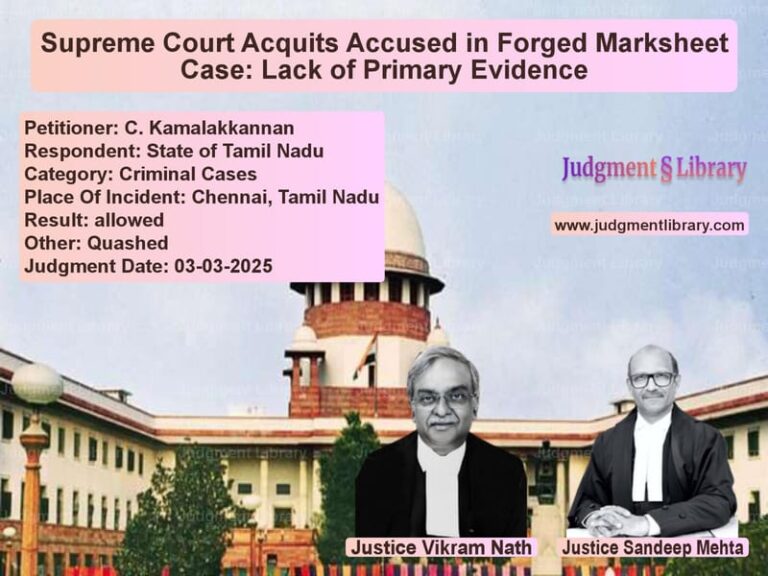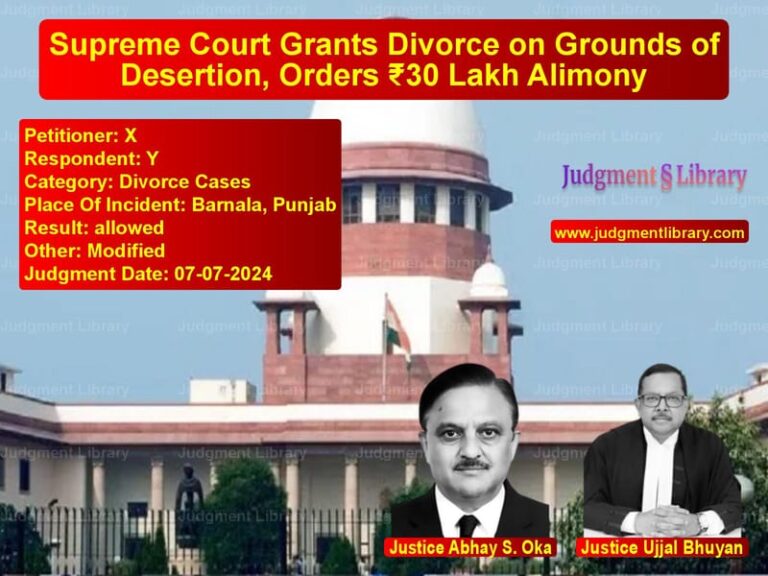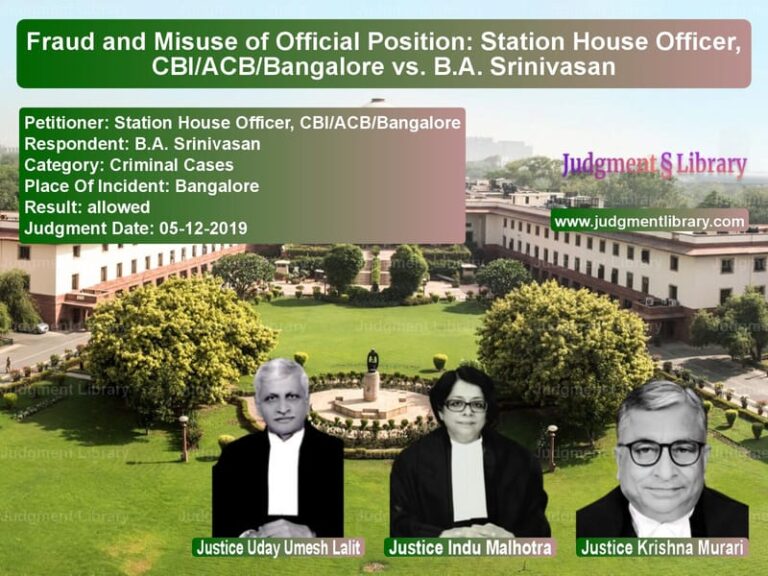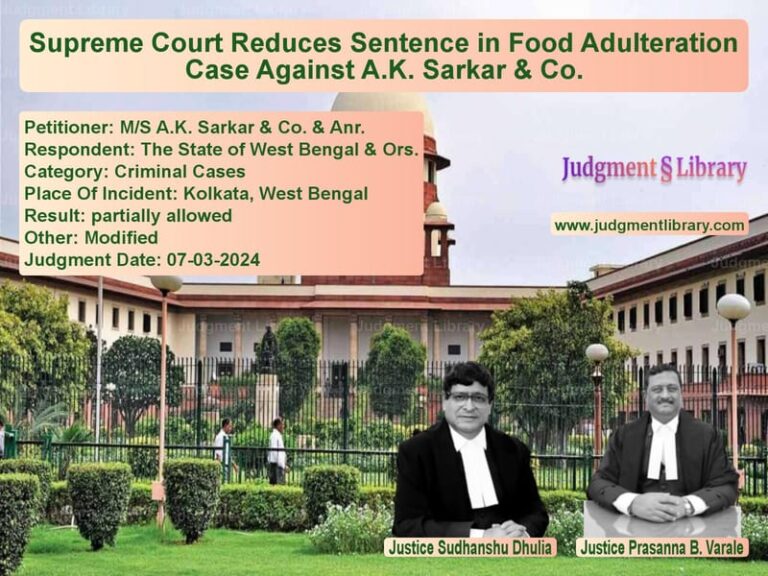Supreme Court Rules on Insufficiently Stamped Documents: Judicial Review and Inherent Powers
The case of G.M. Shahul Hameed v. Jayanthi R. Hegde presents an important legal question regarding the admissibility of insufficiently stamped documents in court proceedings and the extent of judicial review available to rectify such procedural lapses. The Supreme Court, in its judgment dated July 9, 2024, clarified that courts possess inherent powers under Section 151 of the Code of Civil Procedure (CPC) to revisit and rectify errors in admitting insufficiently stamped documents. The Court ruled that even if a document has been marked as evidence, its admission can be reviewed if it was done without judicial application of mind.
This ruling has significant implications for civil litigation, particularly in cases involving property disputes and contractual agreements. It reinforces the principle that courts must ensure proper compliance with stamp duty laws before admitting documents as evidence and can rectify errors even after marking a document as evidence.
Background of the Case
The dispute arose from two conflicting sale deeds concerning a property in Karnataka. The sequence of events leading to the litigation is as follows:
- On October 3, 2003, a sale deed was executed by B. Ramesh Hegde in favor of his wife, the respondent, Jayanthi R. Hegde.
- This sale was based on a General Power of Attorney (GPA) executed on September 16, 2003 by the original owner, Praveen Shetty, in favor of B. Ramesh Hegde.
- Meanwhile, another agreement to sell the same property had been executed between the appellant, G.M. Shahul Hameed, and Praveen Shetty on September 11, 2003.
- Subsequently, a second sale deed was executed on October 8, 2003 between the appellant and Praveen Shetty.
The appellant filed a civil suit seeking to declare the sale deed dated October 3, 2003, as null and void, arguing that the respondent’s transaction was fraudulent. Conversely, the respondent filed a separate suit challenging the validity of the appellant’s sale deed executed on October 8, 2003.
Core Legal Issue: Admission of an Insufficiently Stamped Document
During the trial, the respondent sought to introduce the GPA as evidence. This document, which authorized the execution of the first sale deed, was marked as an exhibit in the absence of an objection from the appellant’s counsel. The appellant later contested this, arguing that:
- The GPA was insufficiently stamped under the Karnataka Stamp Act.
- Under Article 41 of the Karnataka Stamp Act, a power of attorney with the authority to sell a property must be duly stamped based on the market value of the property.
- The document, being prepared on a stamp paper of only ₹100, was legally inadmissible and should have been impounded.
Trial Court’s Decision
The appellant filed two interlocutory applications:
- I.A. No. IX: Seeking review of the admission of the GPA into evidence.
- I.A. No. X: Requesting impounding of the GPA under Section 33 of the Karnataka Stamp Act.
The Trial Court, in its order dated October 19, 2010, allowed both applications, directing the respondent to pay the deficit stamp duty along with the penalty. The court held that:
“The document was marked without application of judicial mind. The admissibility of the document must be reconsidered in the interest of justice.”
High Court’s Ruling
The respondent challenged the Trial Court’s decision in the Karnataka High Court, which ruled in her favor. The High Court held that:
- Once a document is admitted into evidence, its sufficiency of stamp duty cannot be questioned later.
- Section 35 of the Karnataka Stamp Act prevents courts from reviewing an admitted document’s stamp duty sufficiency.
- The appellant’s only remedy was under Section 58 of the Act, which provides for revision of decisions concerning stamp duty sufficiency.
Supreme Court’s Judgment
The Supreme Court overruled the High Court’s decision and reinstated the Trial Court’s ruling. The Court made the following key observations:
1. Courts Have Inherent Powers to Rectify Procedural Errors
The Supreme Court ruled that:
“The Trial Court did have the authority to revisit and recall the process of admission and marking of the instrument, not in the sense of exercising a power of review under Section 114 read with Order XLVII, CPC, but in exercise of its inherent power saved by Section 151 thereof.”
2. Section 35 Does Not Bar Review in Cases of Judicial Oversight
The Court clarified that Section 35 applies only if the document was admitted after judicial determination. In this case, the GPA was admitted without application of judicial mind, making Section 35 inapplicable.
3. Stamp Duty Laws Must Be Strictly Enforced
The Court emphasized the importance of compliance with stamp duty regulations:
“The legislature has reposed responsibility on courts to ensure that requisite stamp duty is duly paid. Allowing an insufficiently stamped document to pass unchallenged would undermine the legal framework.”
4. Precedents Cited
The Court referenced key judgments:
- Javer Chand v. Pukhraj Surana (1962): Once a document is admitted after judicial scrutiny, its admissibility cannot be questioned later.
- Ram Rattan v. Bajrang Lal (1978): Courts must apply their mind before admitting documents; failure to do so makes the admission reviewable.
Conclusion
The Supreme Court’s judgment in G.M. Shahul Hameed v. Jayanthi R. Hegde reinforces the principle that courts can rectify procedural errors in the admission of insufficiently stamped documents. The ruling ensures that stamp duty laws are strictly enforced and prevents parties from bypassing legal requirements through inadvertent or improper admissions of documents in evidence.
Petitioner Name: G.M. Shahul Hameed.Respondent Name: Jayanthi R. Hegde.Judgment By: Justice Dipankar Datta, Justice Pankaj Mithal.Place Of Incident: Karnataka.Judgment Date: 08-07-2024.
Don’t miss out on the full details! Download the complete judgment in PDF format below and gain valuable insights instantly!
Download Judgment: g.m.-shahul-hameed-vs-jayanthi-r.-hegde-supreme-court-of-india-judgment-dated-08-07-2024.pdf
Directly Download Judgment: Directly download this Judgment
See all petitions in Contract Disputes
See all petitions in Property Disputes
See all petitions in Judgment by Dipankar Datta
See all petitions in Judgment by Pankaj Mithal
See all petitions in allowed
See all petitions in Quashed
See all petitions in supreme court of India judgments July 2024
See all petitions in 2024 judgments
See all posts in Civil Cases Category
See all allowed petitions in Civil Cases Category
See all Dismissed petitions in Civil Cases Category
See all partially allowed petitions in Civil Cases Category


